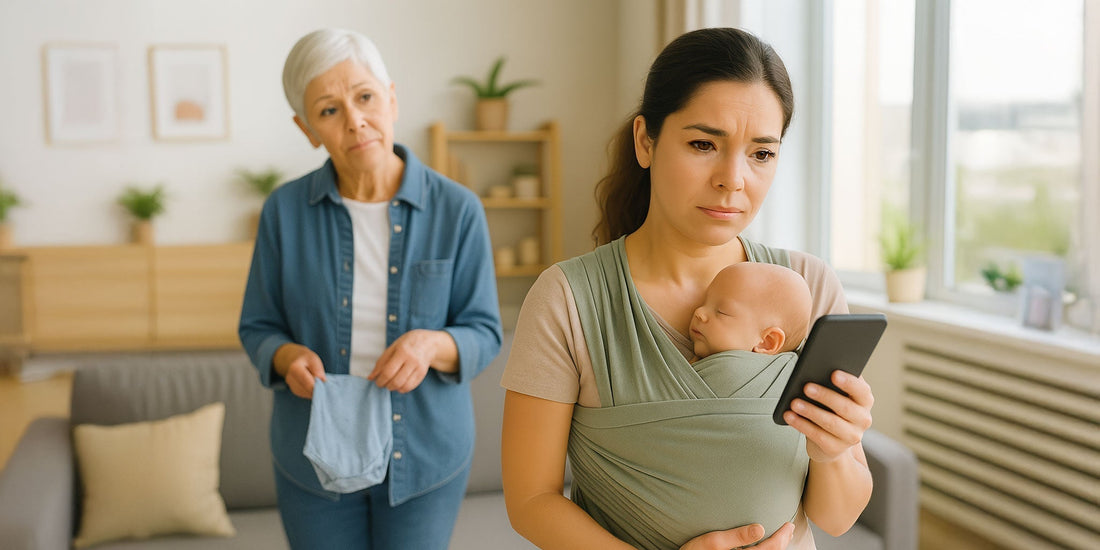
When Grandparents Question Your Parenting: What’s Behind the Tension
Share
It happens: You share a thoughtful choice—about your birth, or feeding, or childcare—and then a parent or in-law responds in a way that questions your choice. It adds a layer of tension that wasn’t there a moment ago, and feels more critical than curious. It’s a common moment that can feel surprisingly personal.
The thing is, grandparents are also adjusting. No, they didn’t just have a baby, and yes, they do get to sleep at night. Their adjustment is more of one of role and relevance. They’re used to being the parent—the decision maker. They spent years raising you, doing their best. They didn’t have algorithms delivering parenting trends daily. There was no social media to introduce standardized terms like wake windows or newborn scrunch. They had their doctor, maybe a couple books, and the people in their everyday lives.
All these years later, here you are—having children of your own. So there’s an earned sense that their efforts were successful.
And now, it can feel like they’re being told—explicitly or indirectly—that their way isn’t good enough. That they’re out of touch.
Sometimes that’s fair. And sometimes it’s not the full picture.
Why Grandparent Criticism of Parenting Feels So Personal
The difference between “helping” and “judging.”
The process of becoming a parent is an evolution: not just for you, but for your own parents as well. The unfolding of your parenting experience creates a mirror for grandparents. They find themselves thinking of their own early parenting years: what went well, what was hard, what they’d change if they could. Sometimes that leads to reflection. Sometimes it leads to comparison. And sometimes, it comes out sideways.
When they say something like, “Why make things harder than they have to be?” it’s easy to feel that they’re dismissing your chosen priorities. That can then snowball into tension, especially when everyone’s tired and figuring things out in real time. On top of all the adjusting, skill-building, and healing you’re doing, you now add navigating tricky family dynamics to your list. It’s both easy and understandable to feel stressed or even resentful in this situation.
Parents Are Protective of Their Children—And for Grandparents, That’s You
Why “we did it this way and you turned out fine” doesn’t land well today.
Today’s influencers and parenting experts on TikTok and Instagram introduce trends, set expectations, and prescribe strategies with total confidence—and often zero accountability.
They aren’t with the new parents crying in frustration because something presented as an essential practice isn’t working out. They don’t experience the, “What are we doing wrong?” moments.
…but grandparents do. They see it up close. And they feel protective—because their child is struggling. And in some cases, they think they know why.
That’s part of what drives the tension. It’s not just resistance to your choices (although that happens too). It’s a gut response to seeing someone they love under pressure.
Parenting Has Changed: Generational Shifts That Cause Tension
I’ve been a doula for more than 30 years. When I started, I was younger than most of my clients—but over time, that shifted. I eventually found myself relating more to the grandparents I used to side-eye. That’s when everything changed.
Instead of trying to teach or convince them, I got curious. I started asking questions—ones that you can ask, too.
-
Tell me something you remember about birth?
-
Where did you get your information?
-
What was helpful? What wasn’t?
When these conversations happen, three things often stand out:
-
I learn things.
-
They feel heard and relax.
-
As a result, the new parents relax too.
How to Respond When Grandparents Criticize Your Parenting Choices
What to say when grandparents don’t respect parenting decisions.
Sometimes they share strategies that are surprisingly smart and resourceful. Other times, they open up about hard parts they hadn’t ever shared. Almost always, the dynamic changes. It feels less like a debate and more like a conversation.
Their input isn’t unsolicited advice—because they’re being asked to share part of their story. Their past. That story is, in fact, the family history. The part being built together, with the addition of this new person—now has a stronger introduction.
Not every grandparent will respond well to this kind of conversation. And not every situation is safe or healthy enough to try. But when possible, showing respect by listening to someone share their story doesn’t mean giving up your agency as a parent. It just means acknowledging that they’ve lived a lot of life, and they may have helpful insight.
Even if you don’t plan to do things the same way, understanding their “why” can ease tension.
Setting Boundaries With Grandparents Without Blowing Up Family Relationships
How to start the conversation before baby arrives.
Picture this: a grandparent sitting down with a new parent and saying:
“I’d love to hear what’s appealing to you about early parenting. What kind of parent do you think you want to be?”
Or:
“Tell me about this idea I keep hearing about… what’s it called, a velcro baby? I’m curious.”
Now flip it: a new parent asking,
“Where did I sleep when I was a new baby? Would you have done anything differently if you’d had more options?”
That kind of conversation builds something. Maybe just understanding. Maybe something closer.
You’re not asking for approval. You’re asking for connection.
Sometimes it helps to use an objective tool—like a printed prompt, a discussion guide, or even a parenting article—as a way to open the conversation. When it’s not coming directly from you, it can feel less emotionally loaded.
Not every grandparent will be open. Not every parent will have the energy.
But when it’s possible, these conversations have the power to shift a relationship. Sometimes even heal one.
And at the very least, they remind everyone involved that the work of parenting doesn’t stop when the kids grow up. It just changes shape.
Tools That Make These Conversations Easier
How to use FACE Cards as part of “family team-building.
Want help starting these conversations? Try our FACE Cards: New Parent Edition.
